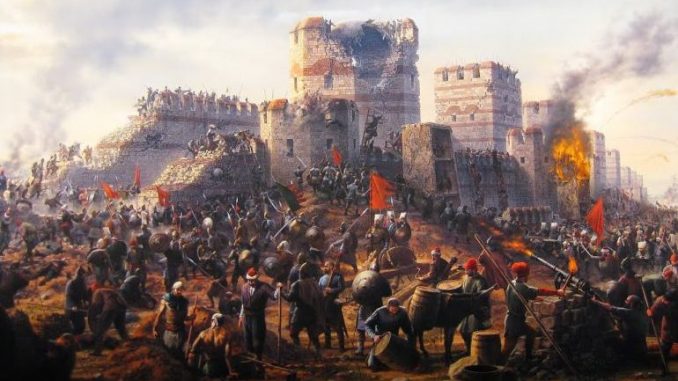
The Fall of Constantinople was the capture of the capital of the Byzantine Empire by an invading Muslim army of the Ottoman Empire on this day, May 29th 1453. The Ottomans were commanded by the then 21-year-old Mehmed the Conqueror, the seventh sultan of the Ottoman Empire, who defeated an army commanded by Byzantine Emperor Constantine XI Palaiologos. Constantinople falls following a 53-day siege that had begun on 6 April 1453.
The capture of Constantinople (and two other Byzantine splinter territories soon thereafter) marked the end of the Roman Empire, an imperial state that had lasted for nearly 1,500 years.The Ottoman conquest of Constantinople also dealt a massive blow to Christendom, as the Muslim Ottoman armies thereafter were left unchecked to advance into Europe without an adversary to their rear. After the conquest, Sultan Mehmed II transferred the capital of the Ottoman Empire from Edirne to Constantinople.
The conquest of the city of Constantinople and the end of the Byzantine Empire was a key event in the Late Middle Ages, which also marks, for some historians, the end of the Middle Ages. It would also set the stage for a robust piracy and slave trade on the Mediterranean, and would prompt two American Presidents, Thomas Jefferson and James Madison to send the The United States Navy to put an end to the Barbary Pirates.
In 1915, leaders of the Turkish Ottoman government set in motion a plan to expel and massacre Christian Armenians living in the Ottoman Empire. Though reports vary, most sources agree that there were about 2 million Armenians in the Ottoman Empire at the time of the massacre. By the early 1920s, when the massacres and deportations finally ended, some 1.5 million of Turkey’s Armenians were dead, with many more forcibly removed from the country. Today, most historians call this event a genocide–a premeditated and systematic campaign to exterminate an entire people. However, the Turkish government does not acknowledge the enormity or scope of these events. Despite pressure from Armenians and social justice advocates throughout the world, it is still illegal in Turkey to talk about what happened to Armenians during this era.



Be the first to comment